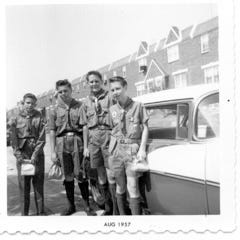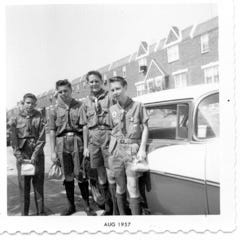You were looking for a place to give your heart
To fill the void in young men’s hearts -David French
like so many other young men of his generation, he felt lost. There was nothing the least bit political about his story. He was seeking hope and purpose. David French
It was sometime during the mid 1980s. Mother Julia Gatta and I engaged in several projects related to a Catholic understanding of the spiritual life. We became friends. I remember at one point there was an election coming up for a suffragan bishop position in the diocese. She thought I should run. I was honored. I held her in great respect, still do. But if I knew anything about what God wanted my life to be about, it was to never be a bishop.
During one of those conversations, I found myself wondering what it was that got me to join the Marine Corps. I can still remember standing in front of a Marine Corps major in 1962 at the then Philadelphia Navy Yard and taking the oath - “I will support and defend the Constitution of the United States…”
I wondered aloud, “why did I decide to do that?” Julia's response was immediate, “you were looking for a place to give your heart.”
But Elisha said, “As the Lord lives, and as you yourself live, I will not leave you.” (2 Kings 2)
You were looking for a place to give your heart
She was right, of course. As soon as the words came out of her mouth, I thought, “that is perfect, that is exactly what was going on at that time in my life.”
David French’s new column “To reach the manosphere, you have to know the manosphere” begins with the story of a young man he met in 2018. French wrote,”like so many other young men of his generation, he felt lost. There was nothing the least bit political about his story. He was seeking hope and purpose, not to join a political movement.” I think it was easier on men and boys when I was young. Our fathers had fought in the Pacific and Europe in a great struggle to defeat totalitarianism. 407,316 of them didn’t return home. As children, we played war games on the stoops in front of the working class row houses in which we grew up. There was still a draft, and we all assumed we would serve. Many of us had given some thought, often just in passing, about the possibility of dying for our country or worse yet killing someone else. At Penn State, Army ROTC was mandatory for the first two years. One day a week we would shine our shoes and polish our brass buttons and wear an Army uniform on campus and go to classes on military strategy and history and learn how to drill. There are many things to be critical about the America of those years. But if you were a young boy in that time, it is likely you had considered what it was to give your heart to something bigger than yourself.
As they continued walking and talking, a chariot of fire and horses of fire separated the two of them, and Elijah ascended in a whirlwind into heaven. Elisha kept watching and crying out, “Father, father! The chariots of Israel and its horsemen!” But when he could no longer see him, he grasped his own clothes and tore them in two pieces. (2 Kings 2)
French poked a bit at the Democratic Party’s wandering in the wilderness. “One of those proposals is a $20 million effort to ‘to reverse the erosion of Democratic support among young men, especially online.’ The goal is to ‘study the syntax, language and content that gains attention and virality in these spaces.’” David French is sympathetic to the Democrats’ desire. But he does question the way they're going about it. He believes that the young men are “seeking hope and purpose.”
He goes on to describe how this is all played out with many young men leaning toward the political right in the last election. His assessment of what was being encouraged was “a brand of masculinity that harms women and wrecks men’s souls.” He was just as critical of how the political left was approaching men: “Men could see that there was much love for women on the left, but they didn’t see the same regard for men. Slogans like ‘the future is female’ created the impression that the sexes were in competition, and for women to win, men had to lose.” He explores the characteristics of “competitiveness and aggression” Aggression seen in male criminal behavior, not so good. The aggression of American boys on D-Day in 1944 France was something to give thanks for.
A definition of sin offered by Richard Holloway (one-time Presiding Bishop of Scotland) is "a wrongly directed effort; a good drive that fails to find the right object; a good thing in itself that is done to excess." (Seven to Flee, Seven to Follow, 1986). This fits Newman’s understanding that, “Evil has no substance of its own, but is only the defect, excess, perversion, or corruption of that which has substance.” Martin Smith, in his book on reconciliation, urges, “Fix your mind on the positive virtues, of which sins are the shadow.” In a related understanding, Martin Thornton viewed the purpose of self-examination as aiming at “tranquillitas; not the suppression of desire, not apatheia, but harmony between the elements of personality.” R. A. Gallagher, Fill All Things
French believes that, “America doesn’t need a left-wing version of Joe Rogan. What it needs is our parents, pastors, teachers and coaches to fill the void in young men’s hearts.”
This abides,
Brother Robert, OA
The Eve of Ascension Day





This reminds me about what Scott Galloway has been saying online.
We recently had a session in Pub Theology on Masculinity and Christianity. I can only say that the discussion was robust and illuminating, and people wanted another opportunity. There were three gay men from very different subcultures, a Dominican-American couple, and myself. I was the oldest person.